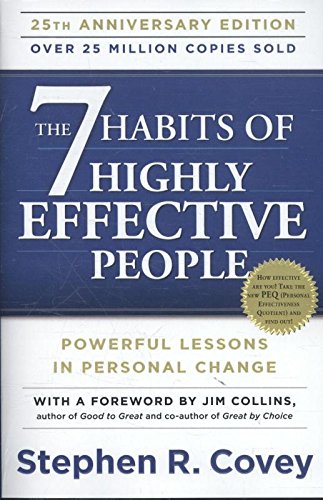3 Takeaways from The 7 Habits of Highly Effective People by Stephen R. Covey
What qualities differentiate highly effective people?
Is it how they manage their day? Their way of thinking? How they approach problems?
In the best-selling book The 7 Habits of Highly Effective People, Stephen R. Covey explains how habits set highly effective people apart.
Here are my 3 Takeaways, in the form of three of the seven habits:
1. Be proactive
If you ask me which of the 7 habits is the most important, my opinion would be this first one: be proactive.
To put these two simple words into consistent action would already generate a multitude of benefits that many people don’t realize or take advantage of.
We see this in others often — they use their “scarce” resources, “imperfect” upbringing, and “lack of” opportunity as excuses, and then play the victim the rest of their lives.
“I didn’t go to the right school”
“I wasn’t given that opportunity like he was”
“My parents made me this way”
and so on.
On the other hand, to be proactive means to take initiative and to exercise control over our thoughts, emotions, and actions. Instead of automatically reacting to outside stimuli, people who are proactive think of the options available and choose how they would respond.
They question the status quo.
They don’t rely on others’ opinions or the external circumstance.
They adapt and evolve.
2. Begin with the end in mind
Imagine you are at a funeral. You think of the person who has passed and how he is remembered.
Was he always stressed?
Was he happy and content?
Did others become happy by being with him?
And then you stand up and walk over to look inside the coffin, only to see your face and realize this is your funeral.
Covey illustrates this story as a wake-up call to those of us who lack direction or purpose.
He says reality is first created in our minds. We need to imagine ourselves as our most fulfilled and happiest selves and align that vision with what we do daily.
It's important to evaluate your situation and set goals. After, map out the regular activities or habits you should be devoting time and energy to in order to help you reach those goals.
This concept can also be applied to other more specific areas —
If you're working on a project, what outcome are you working towards?
If you're preparing for an interview, what impression would you like to leave with your interviewer?
If you are writing a blog post, what message are you trying to convey to the reader?
3. Sharpen the Saw
"Give me six hours to chop down a tree and I will spend the first four sharpening the axe." - Abraham Lincoln (unconfirmed)
To sharpen the saw is the 7th and last habit that Covey talks about.
In any industry, endeavor, or situation, it's necessary for us to commit to continuous learning. Whether it's reading books, listening to podcasts, taking up classes, or attending workshops, we should be devoted to improving our number one asset: ourselves.
Especially with the ever-increasing demands we face today, it's only through self-improvement, self-renewal, or self-care can we become our most productive and effective selves. Covey also explains that to make learning a habit, we should focus on four key areas:
Physical dimension
Spiritual dimension
Mental dimension
Emotional or social dimension
Over to You
From the way they deal with obstacles to the manner that they approach accomplishing their goals, highly effective people certainly have distinguishing qualities. But more than what they do once in a while, it's what they do consistently that counts. The good news is that these habits, whether it's being proactive or continuously learning, are entirely replicable for those who are looking to be highly effective people themselves.
Want to read this book yourself?
Click here to grab your copy of The 7 Habits of Highly Effective People from Amazon.com*
Or get two free audiobooks from Audible*.
*Disclosure: These are affiliate links which means if you click and purchase, I may receive a commission at no extra cost to you.
3 TAKEAWAYS
Since one of the best ways to improve ourselves is to commit to continuous learning, this post is part of the blog mini-series called 3 Takeaways where I discuss three insights from thought-provoking leaders, books, and podcasts.
My purpose initially was to simply read more books, but the learnings were too valuable to keep to myself. My goal has since been to share the vital lessons that will help you be productive and free.
Want to be productive while growing your dream business?
We have over 40 sets of strategic time-saving templates that can help!




















![One Page Media Kit [A] - Navy Blue](https://images.squarespace-cdn.com/content/v1/5849ea99ff7c5026f7bfdc54/1674690328865-341R6EI9WBSEY2RKRDEM/59.jpg)